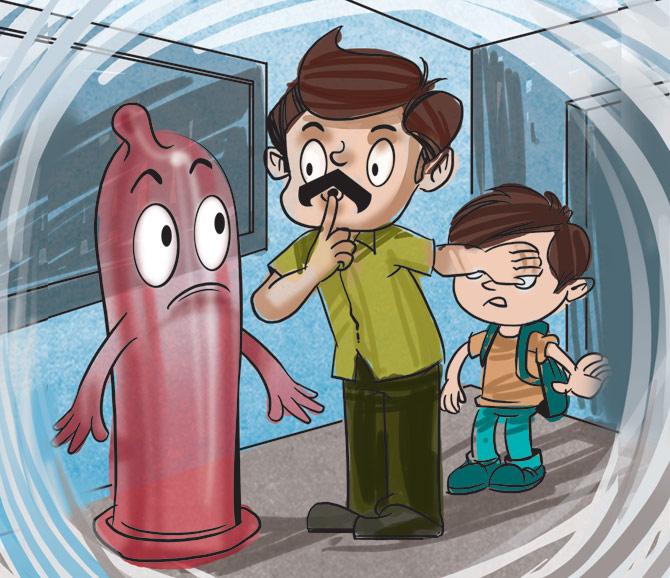So, the band of banned - it has lately ensured that there be no condom advertisements on television between 6 am and 10 pm, in order to protect the children

 So, the band of banned - it has lately ensured that there be no condom advertisements on television between 6 am and 10 pm, in order to protect the children. Well, yes, after all, no condoms were used in the making of those children.
So, the band of banned - it has lately ensured that there be no condom advertisements on television between 6 am and 10 pm, in order to protect the children. Well, yes, after all, no condoms were used in the making of those children.

Illustration/Ravi Jadhav
That does not change the fact that 50 per cent of pregnancies in India are unintended and one in three end in abortion, not always under safe medical supervision, as per a recent Lancet study. The National Family Health Survey shows that though awareness about condoms has gone up among women, condom use itself remains low and in some states has actually gone down. Two out of three women are aware about condoms but less than one in hundred are able to negotiate their use. Tamil Nadu saw one of the largest drops in condoms usage - from 2.3 per cent to 0.8 per cent of the population - while Bihar also saw it fall from 2.3 per cent to just one per cent.
More than one in three women in India use surgical sterilisation as a method of family planning – the highest percentage in the world. The use of the emergency contraceptive pill for routine contraception is rising, even as the median age of sexual debut in India is falling.
But, those who object to the advertisements aren't really interested in, or perhaps even aware of, these figures. The figure that most rivets them is that of Sunny Leone, the ambassador of a condom brand. There is an unmistakable sensuality in these advertisements - just like in ads for soft drinks and cars. But, the idea of women, sex and pleasure in one place gets many panties in a twist. People, both liberal and conservative, who traffic in notions of absolute decency, though decency is a relative term, have always existed. It is to evade censorious characters like this, that innuendo, with all its juicy strawberry playfulness was created.
In their world, sex is never for pleasure and it's definitely not for female pleasure. This proclaimed desire to protect women and children with decency merely serves to mask the dynamics that endanger women's health. Thanks to thinking that sex is only for men then, and men feel condoms come in the way of their pleasure, we create a world in which women's bodies must pay for the moral pleasures of cultural gatekeepers.
Because men refuse to use condoms, and women don't feel sexually or socially confident enough to negotiate these things, not only contraception, but reproduction itself takes place at the cost of women's bodies. The pills, the invasive surgeries, the exposure to disease – must disproportionately be borne by women. The risk of unsafe sex must be borne by young people, women a bit more. But, eventually by men too, because after all sexually and socially, all people are intertwined.
There is worth to advertisements that centre pleasure and also pleasure in women, because they link safe sex to pleasure while expanding the idea of female choice in general. Of course, a conversation is necessary about what different languages are suitable to speak of these things with a nine-year-old and a 19-year-old or in mixed viewing contexts. Banning sweeps all this under a carpet of shame. A language to talk about sex and sex-education needs to be developed. One thing is for sure, that language is not silence.
Paromita Vohra is an award-winning Mumbai-based filmmaker, writer and curator working with fiction and non-fiction. Reach her at www.parodevipictures.com
Download the new mid-day Android and iOS apps to get updates on all the latest and trending stories on the go
 Subscribe today by clicking the link and stay updated with the latest news!" Click here!
Subscribe today by clicking the link and stay updated with the latest news!" Click here!









